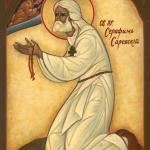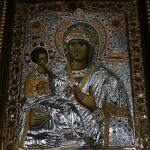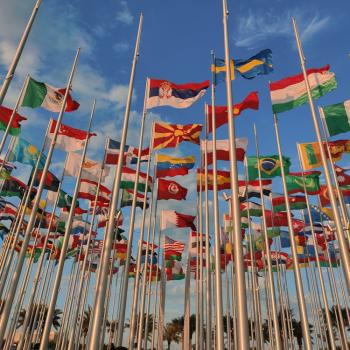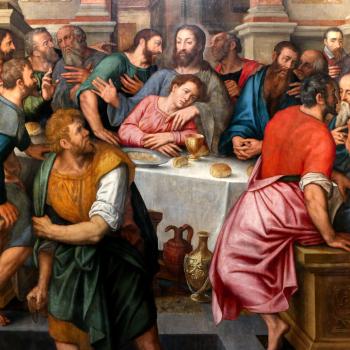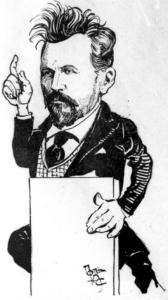
Not long after I was chrismated, one of my Orthodox contacts asked me what I thought of the Sophiologists. At that time, I answered as only I could: I had no thoughts on them because I had not read anything they had written. They barely even registered on what I read or studied up to that point. That would soon change as I would find used copies of several books by Vladimir Solovyov for sale at my favorite used bookstore at the time, The Book Cellar. I started with his Lectures on Godmanhood, and almost immediately, found his work to be brilliant and inspirational, making me look for and buy copies of any of his works which were available in translation at that point. This made me look for and read the other Sophiologists, Sergius Bulgakov and Pavel Florensky, even though, at that time, their major works were not available in English. That would soon change, as Boris Jakim started translating Bulgakov’s and Florensky’s key works, starting with Florensky’s The Pillar and Ground of the Truth. I bought each volume as they were released, finding each of them providing me great amounts of insight, insights which I quickly took on and used to modify and develop my own theological and philosophical understandings. Each of the Sophiologist provided their own unique elements, with Solovyov representing an ecumenical and inter-religious approach to philosophy and theology (especially with his belief that some element of communion continues to exist between Catholic and the Orthodox, a belief which he acted upon by taking Catholic communion), and Bulgakov being the most sophisticated (and systematic) theologian of the three.
Through the years, more and more books and articles by the Sophiologists have been translated into English, each of them bringing various surprises to me. This is exactly the case with the translation of one of Bulgakov’s more obscure works, By the Walls of Chersonesus, which was translated and independently published by Mike Whitton in 2024. I was more than a little taken back by its contents. The work itself was written in 1922, after Bulgakov was exiled from Russia, and it was written in the form of a dialogue representing four different aspects of the intra-Russian Orthodox debate with its four main characters: a “Lay Theologian” who often follows the popular piety of S. Nilus, is a Slavophile, and extremely anti-Catholic; a Hieromonk, representing the spirituality of the Russian starets, who is, like the Lay Theologian, is anti-Catholic and indebted to the nationalistic spirit of Russian Orthodoxy; a “Parish Priest” who is more than willing to question the nationalistic spirit and tradition and seems to represent the sentiment of Vladimir Solovyov’s nephew, Sergius Solovyov; and finally, there is a Refugee, who represents the thoughts Bulgakov was having as the work was being written.
By the Walls of Chersonesus is a work of its time, but it is also a work which has many applications for our time as well. It was written with Bulgakov trying to understand the failure of Russian Orthodoxy and how and why Russia fell into Communist control. A key theme is that Russian Communism continued often with the spirit of Russian Orthodoxy in that it not only embraced an unhealthy nationalism, it tried to take its nationalism and turn it into a messianic mission for Russia, trying to transform the world in its own image. That is, one of the reasons why Russia tried to promote Communism around the world is that it was embracing the messianic image it had of itself while it was Orthodox, an image given to Russia when it embraced the notion that Russia was going to be the third, and final, Rome:
The evil spells retained their force to the full, and only the roles were cast anew. And do you know the present names of those spells? “Graeco-Russian”, in which the first part was in the beginning printed in bold letters: — Graeco and Russian in small, then it went the other way around: in bold – Russian, and small- Graeco. But the hart of the matter is that the Universal, or catholic, Church, is only the Greek or only the Russian Church. Only in Russia is there pure Orthodoxy, that is Christianity, only Russians are orthodox, that is Christians (“peasant farmers”), “Holy Rus”. This is the most perilous identification of the universal with the local, the ecclesial with the national, which in its aroma gave the notorious combination of nationalist principles: Orthodoxy, Autocracy, and Nationalism, and it established the unbearable spiritual atmosphere of Muscovite Rus’ – the Third Rome (pg. 23).
Not only did Bulgakov understand the political problems which emerge from nationalism, he saw it was unchristian, as it served as the foundation for Christianity to become divided when it should be united. It was such nationalism which he saw that lay behind the schism between the Christian East and West, a schism which then allowed the Christian East to take on and embrace Caesaropapism, an ideology which he saw undermined authentic Christian development. While the leader of Russia might have changed from the Orthodox Tsar to Lenin (and later Stalin), the deadly spiritual disease that nationalism gave to Russian Orthodoxy was taken on and further developed by the Communists.
As a result of Bulgakov’s criticism of Russian nationalism, and all Christian nationalism, Bulgakov took on Solovyov’s pro-Catholic sentiment as represented in Solovyov’s Russia and the Universal Church. It is probably because of this, that is, because the book represents an ecclesiological sentiment which Bulgakov would hold for some time but eventually move beyond, Bulgakov only later let the work be preserved (and published) to serve as a relic of his own theological development. For the work, like Solovyov’s work, promotes acceptance of the Pope, of the Council of Florence, and even, the filioque. He saw in it that the Pope helped provide a foundation for Catholicism which Orthodoxy did not have, a leader who could and would speak when difficult questions were being asked and no council was being convened, as well as helping Catholic countries think beyond their own domain and accept a multi-national approach to Christianity. Where Bulgakov differs from Solvoyov is that Bulgakov comes across as an ecclesiastic thinker, that is as a priest and theologian, and that leads him to offer a very clerical analysis, one which contemporary readers can appreciate but engage critically, without losing out on the greater insight of the work.
It is Bulgakov’s constant confrontation of the nationalism contained in Russian Orthodoxy, and with it, Christian nationalism in general, that should make the book an important one for Christians, theologians, philosophers, politicians, and historians to read. For Bulgakov helps present the influence of Christian nationalism on Russian history, and when one understands that influence, one will be able to understand better Putin and the way the Russian Orthodox Church supports him in his ungodly warmongering and tyranny. It will also help the reader understand why such nationalism must be refuted by all Christians, wherever it arises, such as it is found to be arising in the United States today. No country should think of itself as the main representation and defender of Christianity in the world, for, when they begin to think that way, they also begin to take whatever deficiencies and errors found in their form of Christianity and universalize it, spreading a deformed form of Christianity into the world. Moreover, they will begin to believe their messianic mission, their manifest destiny, allows them not only to spread their form of Christianity, but to try to have it control the world, thinking they can and should use any force they need to do so. That is, unlike Christ, when Satan tempted Christ with control over the world, they will give into the temptation, bowing to a Satanic inversion of the Christian faith to do so. Christian nationalism in the United States has done great evil in the name of Christ, as can be seen in the treatment of Native Americans, even as it led Russians to persecute the Jews with pogroms. No country should see itself as having a messianic destiny, one which it must make happen by some sort of authoritarian will-to-power, and Bulgakov, throughout his text, explains how such nationalistic authoritarianism undermines Christ and what Christ brought to the world. Bulgakov specially made it clear, the Russian Revolution, and what Christians were experiencing in Russia, was in part, the result of Christian nationalism. It should serve as a reminder to all Christians what happens if they try to establish some sort of Christian nationalism, some sort of integralism, which undermines the freedom and livelihood, not only non-Christians, but of Christians: their power will not last, and when they lose it, the world will do to them as they did to the world.
I would, therefore, highly recommend By the Walls of Chersonesus, so long as one recognizes it does not represent Bulgakov’s most evolved ecclesiology, that is, as long as one does not try to do with him the way some tried to do with Solovyov, and see him as having become Catholic. Bulgakov gives us a strong look into the darkness the lies with Christian nationalism, and the autocratic ways which emerge from Christian nationalism. He explains how it runs counter to the way of Christ and authentic Christianity, even though Christian nationalism tries to do what it does in the name Christ. With the rise of Christian nationalism today, not just in Russia, but in the United States, there is no better time to take up and explore the themes in this book. To be sure, some elements of the debate found in it might require background knowledge that the ordinary reader does not have, but even then, the general reader will be able to understand the major points being made throughout the work. I think, as Bulgakov reinforces, the threat of war and destruction emerging in the world today is, at least in part, the result of a new rampant Christian nationalism, as Christian nationalism is willing to use violence and threats to get what it wants. And, as the Russian Revolution suggests, it is that violence which non-Christians will pick up, and use, for their own ends.
* This Is Part XXIX In The Personal Reflections And Speculations Series
Stay in touch! Like A Little Bit of Nothing on Facebook.
If you liked what you read, please consider sharing it with your friends and family!
N.B.: While I read comments to moderate them, I rarely respond to them. If I don’t respond to your comment directly, don’t assume I am unthankful for it. I appreciate it. But I want readers to feel free to ask questions, and hopefully, dialogue with each other. I have shared what I wanted to say, though some responses will get a brief reply by me, or, if I find it interesting and something I can engage fully, as the foundation for another post. I have had many posts inspired or improved upon thanks to my readers.


